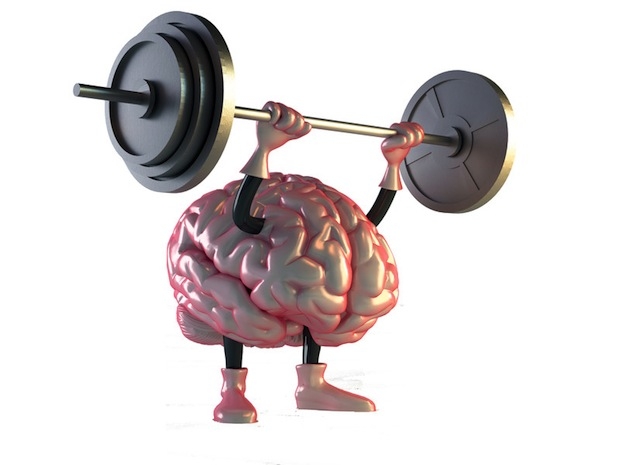Recent studies have proven that exercise goes way beyond aiding with muscle development and weight loss. Most of us are aware by now that it also helps with mood and depression, but research has now proven that exercise helps develop/grow the brain in areas of memory, mental focus, learning, and cognitive performance in people of all ages.
Scientists from UCLA found that exercise is one of the few ways to generate new neuron growth and the number of dendrite connections between neurons. Exercise does this by increasing the heart rate (which creates more blood and oxygen flow to the brain) and in aiding in the body’s release of hormones; providing a nourishing environment for cell growth. The brain naturally starts to lose nerve tissue starting at around 30 years of age so this growth discovery suggests possible prevention and treatment for diseases that progress via the loss of neurons, such as cognitive impairment, Alzheimer’s, and Parkinson’s.
Furthermore, a study published by the British Medical Journal found that 10 to 40 minute bursts of exercise prior to activities that need concentration such as work and studying lead to an immediate boost in mental focus, better retention of new information, and handling stress.
Strength or Cardio Training?
Many studies found that aerobic activity better supports brain cell growth than strength training. The reasoning behind this is that strength training requires too much blood flow to go to the muscles instead of the brain. However, Teresa Liu-Ambrose, an associate professor in the Brain Research Center at the University of British Columbia is one of many who advises incorporating both types of training into your workout to receive the highest amount of benefits. Her findings suggest that each type of exercise target different areas of the brain and therefore, different types of memory (probably due to releasing different proteins in the body and brain)
For a great all-in-one STRENGTH TRAINING & CARDIO workout try THE HUMAN TRAINER suspension gym.
It is agreed by all parties that sustained moderate-intensity workouts are better for brain development than intense “hard-pushing” workouts.
Exercise’s Affects On…
– Depression
It may actually be possible to exercise to happiness. Depression is associated with low levels of serotonin and norepinephrine (more on norepinephrine below) and exercise increases concentrations of these neurotransmitters by stimulating the sympathetic nervous system.
Research on rats has found that a combination of exercise and antidepressants reduced depression symptoms in as little as 2 days, whereas it took two weeks to start noticing a decrease in symptoms in the rats that were given the antidepressants alone. This indicates a potential for immediate results for depression patients when incorporating exercise into their treatment.
Research on humans suggests that burning off 350 calories three times a week through sustained, moderate-intensity exercise can reduce symptoms of mild depression almost as well as antidepressants do.
(FYI- Anxiety Disorders have also been found to respond well to exercise, but there has been little to no results with Bipolar disorder)
– Norepinephrine Levels
As mentioned above, exercise has also been linked to increasing the levels of a hormone and neurotransmitter called norepinephrine. Deficiencies in norepinephrine has been linked to lack of motivation, lack of energy, depression, ADHD, and Alzheimer’s.
– Stress
The hippocampus is a part of the brain that plays an important role in retaining information for short and long-term memory. Though the hippocampus naturally shrinks with age, a hormone called cortisol which is created by stress has been found to deteriorate the hippocampus at a much accelerated rate.
Exercise does produce stress on the body and therefore a release of cortisol, but exercise training regularly has been found to increase the brain’s ability to handle cortisol, making the body more resilient to stress. Studies have also found that exercise increases the volume of the hippocampus, therefore counteracting the natural shrinking that occurs with age.
It’s Never too Early to Start
You may think that you are too young to have to start worrying about memory loss, but the brain starts aging as early as your 30‘s. Furthermore, unhealthy lifestyle habits like unhealthy eating and lack of exercise that can lead to memory problems are often instilled at a very young age, and are carried throughout life if you do not make an effort to change them. So why not make a change right now!
How much Exercise does the Brain Need?
No one knows the exact amount of exercise needed for ultimate brain performance and growth. The Alzheimer’s Association recommends aiming for about half an hour a day of physical activity to ward off Alzheimer’s, and I think that is a good amount to aim for, for a healthy lifestyle in general.
I know what you’re thing. You can be the next super-genius, right?
My apologies if this article caused you to dream of being the king of the world. Unfortunately there is a limit to how far exercise can take you. Research on mice bred to overexercise showed that these mice developed an inability to learn. A possibility for this outcome is that the preoccupation with exercise caused a disruption of cognitive function. The overexercising mice had elevated neuron growth but the levels eventually reached a plateau. Sorry to burst your bubble, you can’t become the next genius superhero. :p
Resources: boston.com, serendip.brynmawr.edu, new york times, NBCnews, webMD, wikipedia, positscience.com





 Payments powered by:
Payments powered by:

